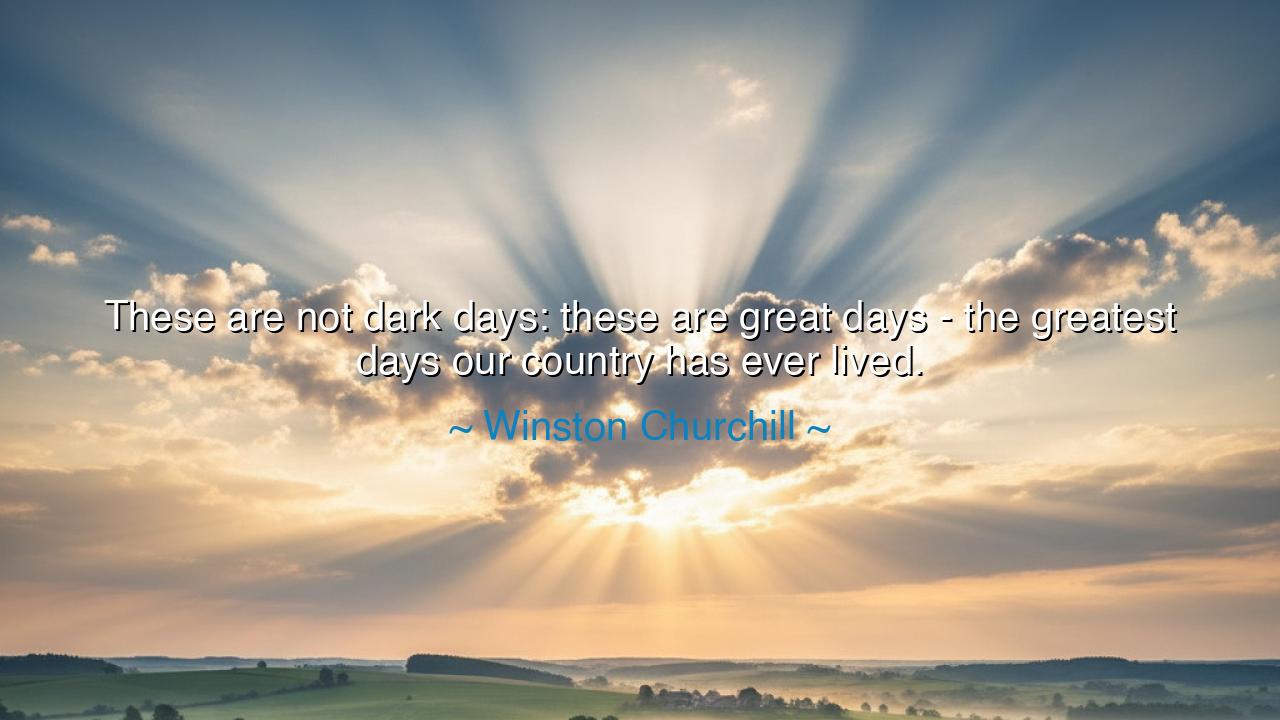
These are not dark days: these are great days - the greatest days
These are not dark days: these are great days - the greatest days our country has ever lived.






The great Winston Churchill, a man forged in the fires of war and destiny, once declared: “These are not dark days: these are great days – the greatest days our country has ever lived.” These words were spoken in 1941, when Britain stood battered yet unbroken in the face of the Nazi onslaught. Bombs fell nightly over London, cities lay in ruin, and the future seemed clouded with despair. Yet, from that darkness, Churchill’s voice rose not as a whisper of comfort, but as a trumpet of defiance. He called the people not to lament their suffering, but to see within it the birth of glory—the proof of their courage, the measure of their greatness.
To call such days “great” when all seemed lost was no empty boast; it was a summons to the spirit of endurance. Churchill understood that greatness is not forged in ease or prosperity, but in struggle. The greatness of a people, like that of a soul, reveals itself when the night is darkest. He saw what others could not—that in the very act of standing firm against tyranny, Britain had become the moral heart of the world. The bombs that fell upon their homes were terrible, but they also lit the fire of unity and honor. These were not dark days, he said, because the light within the people was brighter than the flames above them.
This quote finds its origin in one of Churchill’s wartime speeches, delivered at a moment when even his closest allies questioned whether victory was possible. Yet Churchill’s genius lay not only in military strategy, but in his ability to speak to the soul of a nation. He knew that despair kills faster than any bullet, and that words, when wielded by faith, can lift a nation’s heart higher than any weapon can reach. His declaration transformed fear into purpose, grief into resolve. To him, suffering was not shameful—it was sacred, for it tested and revealed the deepest strength of the human spirit.
History remembers the story of the Blitz, when London burned under nightly bombardment. The people slept in subway tunnels, wrapped in blankets, their city shaking above them. Yet every morning, they emerged to sweep the glass, repair the walls, and return to life as though defying the enemy by their very persistence. A woman might hang her washing on the same line that had caught embers from an air raid the night before. A child would play in a street scarred by bombs, his laughter rising against the wail of sirens. This, Churchill saw, was not darkness—it was light undimmed. These were great days because they revealed what no peaceful day could ever show: the unconquerable soul of a free people.
There is an ancient truth here, older than war and deeper than nationhood—that glory often disguises itself in hardship. The ancients said that the gods test those they favor, and that the path to greatness winds always through trial. So it was with Britain then, and so it remains with humankind today. When Churchill spoke of “great days,” he was not blinded to suffering; he was proclaiming that meaning can triumph over misery, that even in the ashes of ruin there is dignity, courage, and hope.
This wisdom extends beyond the battlefield. Each person, in their own life, faces moments that seem dark—loss, failure, or despair. Yet Churchill’s message is timeless: these are not dark days if we choose to meet them with valor. Greatness is not found in avoiding struggle, but in transcending it. When life tests us, when the world seems to collapse around us, we are given a sacred chance to rise, to prove the worth of our character, to transform adversity into triumph.
The lesson is clear and eternal: never mistake difficulty for defeat. The light of the human heart shines brightest when the world seems lost. Practical action: when hardship comes, do not hide from it; face it. Find purpose within it. Ask not, “Why must I suffer?” but rather, “What greatness can be born of this?” For those who can hold fast to courage amid calamity will one day look back, as Churchill did, and say—not with pride alone, but with reverence—these were not dark days; these were great days.
Thus, his words endure not as a relic of war, but as a call to every soul who has ever faced despair. Let them remind you that the true measure of life is not found in ease, but in the flame of endurance. For in the darkest hours of history—and of the heart—it is courage, faith, and steadfast will that turn the night into day, and transform our suffering into greatness.






AAdministratorAdministrator
Welcome, honored guests. Please leave a comment, we will respond soon